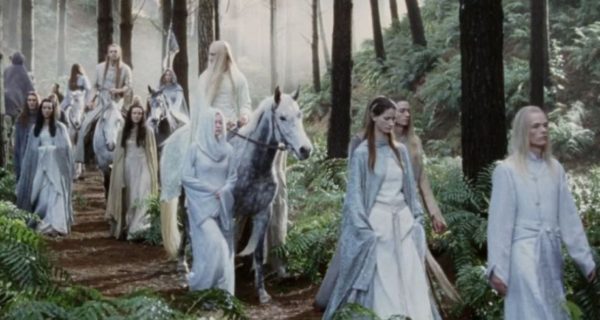I admit my love and awe for the totally-superior-to-humans Middle-earth Elves (especially ones in the center of action) puts me in a position to be hoodwinked every now and again. And it’s just as well. If I hadn’t been tricked and suckered a few years ago in quite a humiliating fashion, thanks to this love, I probably wouldn’t have been inspired to write this article. If you enjoy reading this, I’ll consider myself mollified.
I still can’t remember exactly what I was thinking about. Perhaps it was the plot of my novel-in-the-works, my pettest of pet characters, or a certain fictional setting I was conjuring up at the time. I could have very well been thinking about the graphics for a particular magazine issue, or the latest football game, or the sad condition of my hair reflected in the window. As I thought and thought, water trickled lazily into the two-handled pot crusted with remnants of spicy jambalaya. I, one of the anointed dish-doers of the family, stood holding the pot over the sink, absently squeezing dish detergent under the faucet’s flow, gazing all the while out the window into the early-come December night.
My father’s voice abruptly exploded my detached state of dishwater equilibrium.
“Girls! Girls!” he shouted from the front room, as though the Pope were in our driveway. “Come quick! Real elves!”
Out of my hands crashed the jambalaya pot, into the sink. Across the kitchen floor I flew. I barely noticed how my sister was facing my father, and not the television. In an agony of anticipation, I whirled towards the glowing tube, and I saw . . . I saw . . .
“I . . . I want to be a dentist!”
You guessed it. NBC, all afire with holiday spirit, was airing Rudolph the Red-Nosed Reindeer, and I’d come just in time to see Hermie being berated for not being at elf practice.
All my ecstatic visions of Middle-earth’s ethereal Elves screeched to a halt like a car in front of a blinking deer, or perhaps a song under the finger of a faulty record player. Filled with shock and gallons of embarrassment, I turned towards my father. He was rocking back and forth in his chair, positively choking with laughter.
Hook, line, and sinker, his face said.
Elves are, simply put, stunning to the point of unfairness, made manifest especially by the directors and designers of The Lord of the Rings and The Hobbit films; yet even in the books, they still retain fantastic-ness. Legolas, Thranduil, Haldir, Elrond, Arwen, Galadriel, Tauriel, Celeborn (whom I insist looks like an elven Pete Malloy, but maybe it’s because I’m an Adam-12 junkie and I manage to find comparisons everywhere) . . . the list goes on and on. When Legolas slides out his knives at Balin’s Tomb or alights gracefully from a Mumakil’s trunk, when Haldir arrives unbidden at Helm’s Deep with a throng of archers, when Arwen stands in foresight before her husband’s future tomb, or even when Thranduil loses it and decapitates an orc prisoner, I am completely riveted. They are warriors unmatched; they glow with unearthly light; their speech is stately; their intelligence superior; their counsels secluded, yet they are there for us mortals in our dark hours . . . And that hair. Long, sleek, immune to humidity. If they’re at times a trifle arrogant, well, who can blame them?
Thanks to the Elves, I always find it a very attractive idea to lollygag about in a wooded area, watching the wind and sunlight filter through shivering leaves, and pretend I’m a good six inches taller, dressed in flowing garments with delicately pointy ears and an instinctive knowledge of the Quenya or Sindarin tongues, to where I can sing lays and laments to my heart’s content. I relish the idea of being able to swing myself backwards into a horse’s saddle (I refuse to believe the shot of Legolas performing such a feat was really only CGI). Wouldn’t it be wonderful if we didn’t leave behind footprints—or if we could see the ant-speck band of Uruk-hai (or, er, a football game, for that matter) miles and miles away? Or what about being able to wield cunningly crafted weapons without breaking nary a sweat? All these things the Elves can do—and then they rather snub us because we mortals grow quarrelsome and ambitious. But it’s all their fault, correct?
Of course, there is much to love about Lord of the Rings, with or without the presence of Elves: I relish watching Hobbits, dwarves, men, and the occasional (well, maybe not-so-occasional) deranged orc. But Elves are the . . . how do I put this . . . flop-back-on-the-couch-and-bewail-your-lack-of-coolness factor of the films. They’re the reason I unabashedly shiver whenever they appear on-screen and whisper to myself, “This is so amazing!”
If I had appeared in Peter Jackson’s famous film The Two Towers, I would have undoubtedly been the sideline Rohanian standing near the gate, his face plastered with an overwhelmed mixture of joy, relief and awe when legions of battle-ready Elves came pouring through the gate of Helm’s Deep. (In fact, he was probably the one who invented and marketed Elf Trading Cards, once the War of the Ring was over and done.) Because Elves simply deserve that kind of awe. It isn’t fair, but we humans have to deal with it, all the same . . . even if it does mean a mere mortal girl making a fool of herself over Hermie on NBC every now and again!

